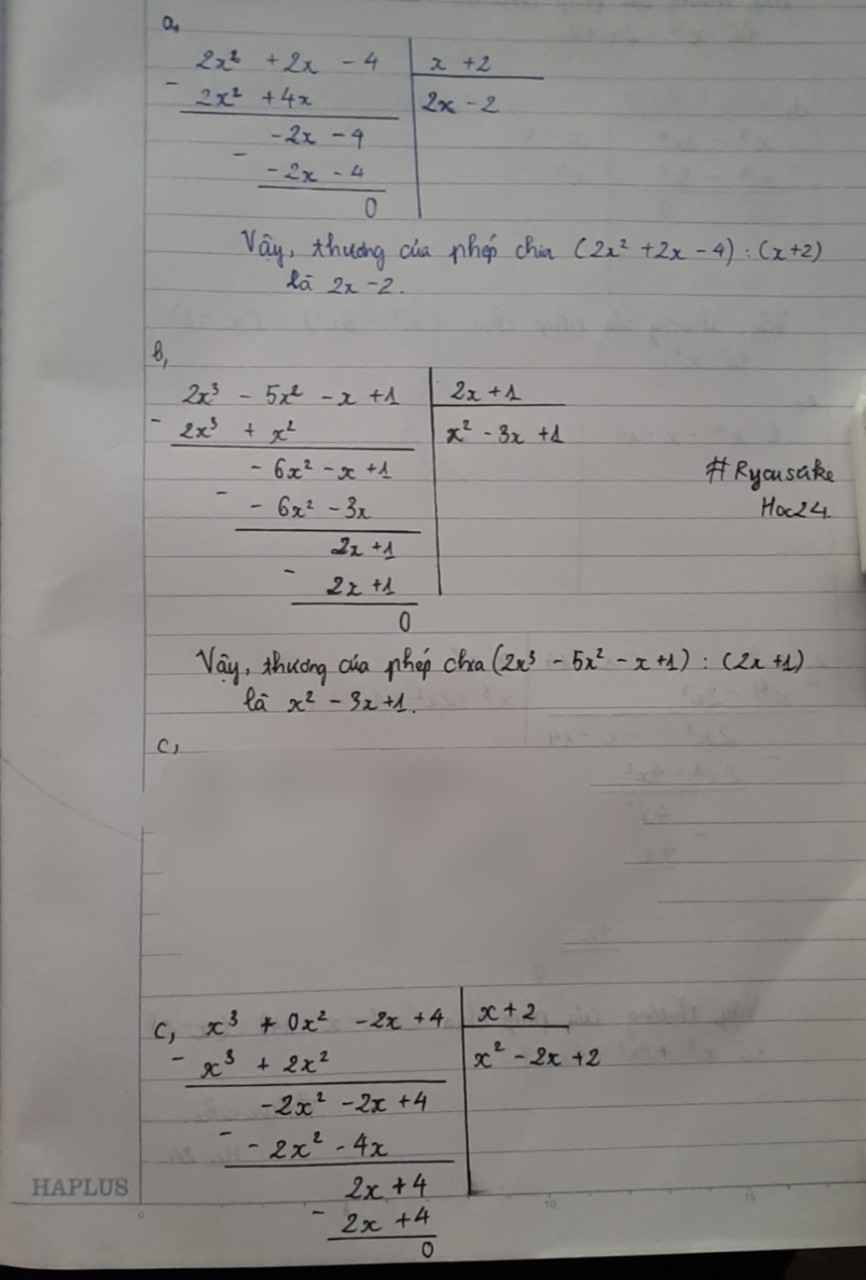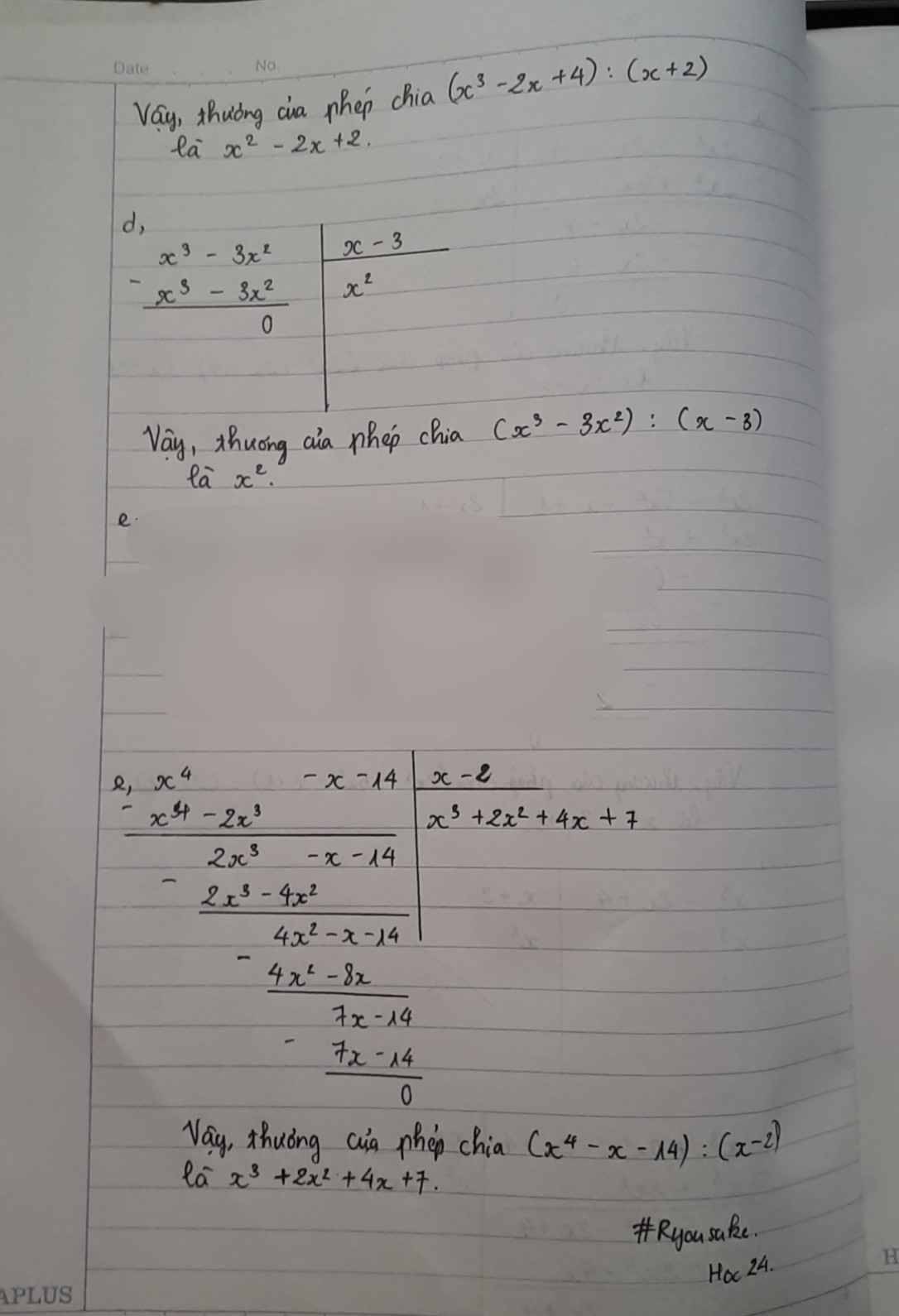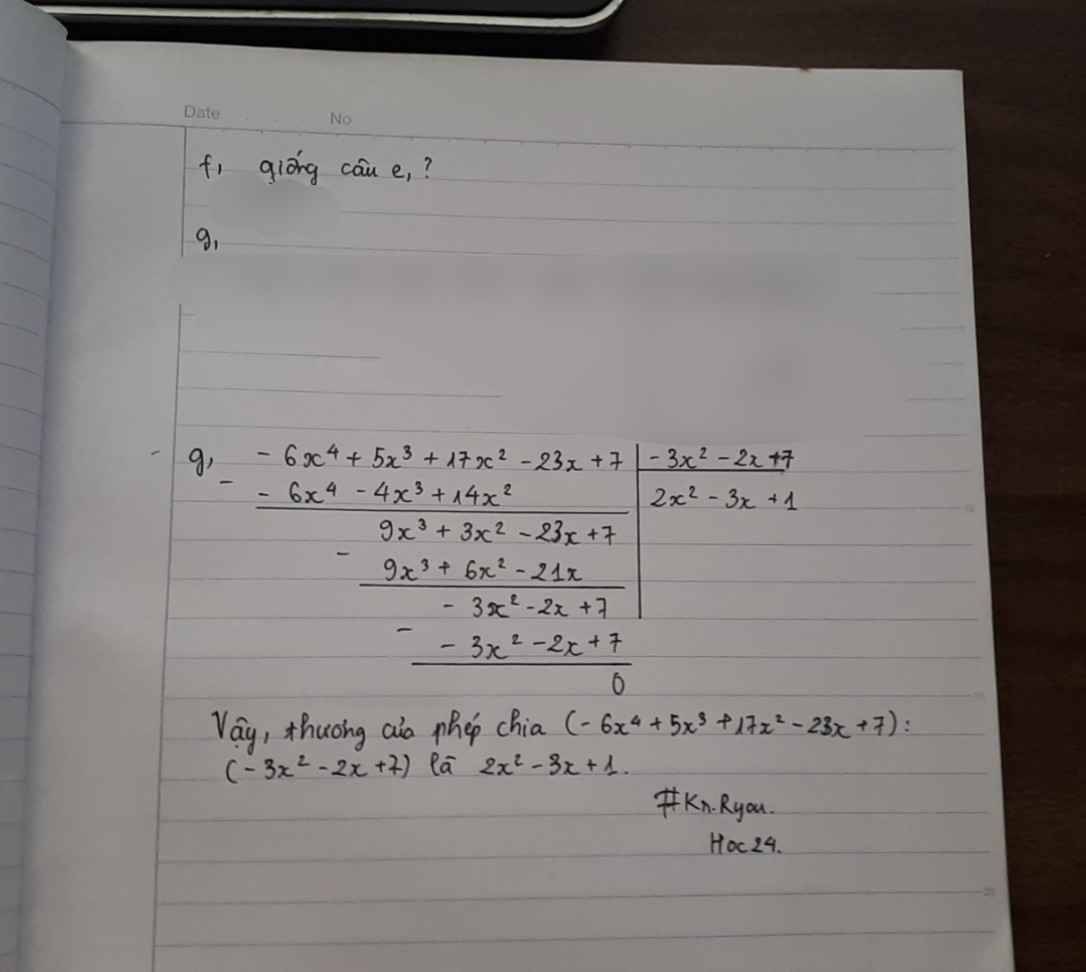d) (x ^ 2)/(2x + 4) / ((2x + 2)/(x + 2))

Những câu hỏi liên quan
Giải phương trình
a) \(\sqrt{x^2-2x+4}=2x-2\)
b) \(\sqrt{x+2\sqrt{x-1}}=2\)
c) \(\sqrt{2x^2-2x+1}=2x-1\)
d) \(\sqrt{x+4\sqrt{x-4}}=2\)
a.
PT \(\Leftrightarrow \left\{\begin{matrix} 2x-2\geq 0\\ x^2-2x+4=(2x-2)^2\end{matrix}\right.\Leftrightarrow \left\{\begin{matrix} x\geq 1\\ 3x^2-6x=0\end{matrix}\right.\)
\(\Leftrightarrow \left\{\begin{matrix} x\geq 1\\ 3x(x-2)=0\end{matrix}\right.\Leftrightarrow x=2\)
b. ĐK: $x\geq 1$
PT $\Leftrightarrow \sqrt{(x-1)+2\sqrt{x-1}+1}=2$
$\Leftrightarrow \sqrt{(\sqrt{x-1}+1)^2}=2$
$\Leftrightarrow |\sqrt{x-1}+1|=2$
$\Leftrightarrow \sqrt{x-1}+1=2$
$\Leftrightarrow \sqrt{x-1}=1$
$\Leftrightarrow x=2$ (tm)
Đúng 1
Bình luận (0)
c.
PT \(\Leftrightarrow \left\{\begin{matrix} 2x-1\geq 0\\ 2x^2-2x+1=(2x-1)^2\end{matrix}\right.\Leftrightarrow \left\{\begin{matrix} x\geq \frac{1}{2}\\ 2x^2-2x+1=4x^2-4x+1\end{matrix}\right.\)
\(\Leftrightarrow \left\{\begin{matrix} x\geq \frac{1}{2}\\ 2x^2-2x=2x(x-1)=0\end{matrix}\right.\Leftrightarrow x=1\) (tm)
d.
ĐKXĐ: $x\geq 4$
PT $\Leftrightarrow \sqrt{(x-4)+4\sqrt{x-4}+4}=2$
$\Leftrightarrow \sqrt{(\sqrt{x-4}+2)^2}=2$
$\Leftrightarrow |\sqrt{x-4}+2|=2$
$\Leftrightarrow \sqrt{x-4}+2=2$
$\Leftrightarrow \sqrt{x-4}=0$
$\Leftrightarrow x=4$ (tm)
Đúng 1
Bình luận (0)
a: Ta có: \(\sqrt{x^2-2x+4}=2x-2\)
\(\Leftrightarrow x^2-2x+4=4x^2-8x+4\)
\(\Leftrightarrow-3x^2+6x=0\)
\(\Leftrightarrow-3x\left(x-2\right)=0\)
\(\Leftrightarrow x=2\)
b: Ta có: \(\sqrt{x+2\sqrt{x-1}}=2\)
\(\Leftrightarrow\left|\sqrt{x-1}+1\right|=2\)
\(\Leftrightarrow\sqrt{x-1}+1=2\)
\(\Leftrightarrow x-1=1\)
hay x=2
c: Ta có: \(\sqrt{2x^2-2x+1}=2x-1\)
\(\Leftrightarrow2x^2-2x+1=4x^2-4x+1\)
\(\Leftrightarrow-2x^2+2x=0\)
\(\Leftrightarrow-2x\left(x-1\right)=0\)
hay x=1
Đúng 1
Bình luận (0)
Xem thêm câu trả lời
Bài 4: Tìm x, biết:
a) 3(2x – 3) + 2(2 – x) = –3 ; b) x(5 – 2x) + 2x(x – 1) = 13 ;
c) 5x(x – 1) – (x + 2)(5x – 7) = 6 ; d) 3x(2x + 3) – (2x + 5)(3x – 2) = 8 ;
e) 2(5x – 8) – 3(4x – 5) = 4(3x – 4) + 11; f) 2x(6x – 2x 2 ) + 3x 2 (x – 4) = 8.
\(a,3\left(2x-3\right)+2\left(2-x\right)=-3\\ \Leftrightarrow6x-9+4-2x=-3\\ \Leftrightarrow4x=2\\ \Leftrightarrow x=\dfrac{1}{2}\\ b,x\left(5-2x\right)+2x\left(x-1\right)=13\\ \Leftrightarrow5x-2x^2+2x^2-2x=13\\ \Leftrightarrow3x=13\\ \Leftrightarrow x=\dfrac{13}{3}\\ c,5x\left(x-1\right)-\left(x+2\right)\left(5x-7\right)=6\\ \Leftrightarrow5x^2-5x-5x^2-3x+14=6\\ \Leftrightarrow-8x=-8\\ \Leftrightarrow x=1\\ d,3x\left(2x+3\right)-\left(2x+5\right)\left(3x-2\right)=8\\ \Leftrightarrow6x^2+9x-6x^2-11x+10=8\\ \Leftrightarrow-2x=-2\\ \Leftrightarrow x=1\)
\(e,2\left(5x-8\right)-3\left(4x-5\right)=4\left(3x-4\right)+11\\ \Leftrightarrow10x-16-12x+15=12x-16+11\\ \Leftrightarrow-14x=-4\\ \Leftrightarrow x=\dfrac{2}{7}\\ f,2x\left(6x-2x^2\right)+3x^2\left(x-4\right)=8\\ \Leftrightarrow12x^2-4x^3+3x^3-12x^2=8\\ \Leftrightarrow-x^3-8=0\\ \Leftrightarrow-\left(x^3+8\right)=0\\ \Leftrightarrow-\left(x+2\right)\left(x^2-2x+4\right)=0\\ \Leftrightarrow\left[{}\begin{matrix}x=-2\\x\in\varnothing\left(x^2-2x+4=\left(x-1\right)^2+3>0\right)\end{matrix}\right.\)
Đúng 3
Bình luận (0)
Bài 4:
a: Ta có: \(3\left(2x-3\right)-2\left(x-2\right)=-3\)
\(\Leftrightarrow6x-9-2x+4=-3\)
\(\Leftrightarrow4x=2\)
hay \(x=\dfrac{1}{2}\)
b: Ta có: \(x\left(5-2x\right)+2x\left(x-1\right)=13\)
\(\Leftrightarrow5x-2x^2+2x^2-2x=13\)
\(\Leftrightarrow3x=13\)
hay \(x=\dfrac{13}{3}\)
c: Ta có: \(5x\left(x-1\right)-\left(x+2\right)\left(5x-7\right)=6\)
\(\Leftrightarrow5x^2-5x-5x^2+7x-10x+14=6\)
\(\Leftrightarrow-8x=-8\)
hay x=1
Đúng 0
Bình luận (0)
a/ \(3\left(2x-3\right)+2\left(2-x\right)=-3\)
\(\Leftrightarrow6x-9+4-2x=-3\)
\(\Leftrightarrow4x=2\)
\(\Leftrightarrow x=\dfrac{1}{2}\)
Vậy: \(x=\dfrac{1}{2}\)
===========
b/ \(x\left(5-2x\right)+2x\left(x-1\right)=13\)
\(\Leftrightarrow5x-2x^2+2x^2-2x=13\)
\(\Leftrightarrow3x=13\)
\(\Leftrightarrow x=\dfrac{13}{3}\)
Vậy: \(x=\dfrac{13}{3}\)
==========
c/ \(5x\left(x-1\right)-\left(x+2\right)\left(5x-7\right)=6\)
\(\Leftrightarrow5x^2-5x-5x^2+7x-10x+14=6\)
\(\Leftrightarrow-8x=-8\)
\(\Leftrightarrow x=1\)
Vậy: \(x=1\)
==========
d/ \(3x\left(2x+3\right)-\left(2x+5\right)\left(3x-2\right)=8\)
\(\Leftrightarrow6x^2+9x-6x^2+4x-15x+10=8\)
\(\Leftrightarrow-2x=-2\)
\(\Leftrightarrow x=1\)
Vậy: \(x=1\)
==========
e/ \(2\left(5x-8\right)-3\left(4x-5\right)=4\left(3x-4\right)+11\)
\(\Leftrightarrow10x-16-12x+15=12x-16+11\)
\(\Leftrightarrow-14x=-4\)
\(\Leftrightarrow x=\dfrac{2}{7}\)
Vậy: \(x=\dfrac{2}{7}\)
==========
f/ \(2x\left(6x-2x^2\right)+3x^2\left(x-4\right)=8\)
\(\Leftrightarrow12x^2-4x^3+3x^3-12x^2=8\)
\(\Leftrightarrow-x^3=8\)
\(\Leftrightarrow x=-2\)
Vậy: \(x=-2\)
Đúng 0
Bình luận (0)
Giải phương trình
a
)
2
x
+
3
x
-
4
2
x
-
1
x
+
2
-
27
b
)
x
2
-
4
-
x
+
5...
Đọc tiếp
Giải phương trình
a ) 2 x + 3 x - 4 = 2 x - 1 x + 2 - 27
b ) x 2 - 4 - x + 5 2 - x = 0
c ) x + 2 x - 2 - x - 2 x + 2 = 4 x 2 - 4
d ) x + 1 x - 1 - x + 2 x + 3 + 4 x 2 + 2 x - 3 = 0
a) 2(x + 3)(x – 4) = (2x – 1)(x + 2) – 27
⇔ 2(x2 – 4x + 3x – 12) = 2x2 + 4x – x – 2 – 27
⇔ 2x2 – 2x – 24 = 2x2 + 3x – 29
⇔ -2x – 3x = 24 – 29
⇔ - 5x = - 5 ⇔ x = -5/-5 ⇔ x = 1
Tập nghiệm của phương trình : S = {1}
b) x2 – 4 – (x + 5)(2 – x) = 0
⇔ x2 – 4 + (x + 5)(x – 2) = 0 ⇔ (x – 2)(x + 2 + x + 5) = 0
⇔ (x – 2)(2x + 7) = 0 ⇔ x – 2 = 0 hoặc 2x + 7 = 0
⇔ x = 2 hoặc x = -7/2
Tập nghiệm của phương trình: S = {2; -7/2 }
c) ĐKXĐ : x – 2 ≠ 0 và x + 2 ≠ 0 (khi đó : x2 – 4 = (x – 2)(x + 2) ≠ 0)
⇔ x ≠ 2 và x ≠ -2
Quy đồng mẫu thức hai vế :

Khử mẫu, ta được : x2 + 4x + 4 – x2 + 4x – 4 = 4
⇔ 8x = 4 ⇔ x = 1/2( thỏa mãn ĐKXĐ)
Tập nghiệm của phương trình : S = {1/2}
d) ĐKXĐ : x – 1 ≠ 0 và x + 3 ≠ 0 (khi đó : x2 + 2x – 3 = (x – 1)(x + 3) ≠ 0)
⇔ x ≠ 1 và x ≠ -3
Quy đồng mẫu thức hai vế :

![]()
Khử mẫu, ta được : x2 + 3x + x + 3 – x2 + x – 2x + 2 + 4 = 0
⇔ 3x = -9 ⇔ x = -3 (không thỏa mãn ĐKXĐ)
Tập nghiệm của phương trình : S = ∅
Đúng 0
Bình luận (0)
\(2\left(x+3\right)\left(x-4\right)=\left(2x-1\right)\left(x+2\right)-27\)
\(< =>2\left(x^2-x-12\right)=2x^2+3x-2-27\)
\(< =>2x^2-2x-24=2x^2+3x-2-27\)
\(< =>5x=-24+29=5\)
\(< =>x=\frac{5}{5}=1\)
\(x^2-4-\left(x+5\right)\left(2-x\right)=0\)
\(< =>\left(x-2\right)\left(x+2\right)+\left(x+5\right)\left(x-2\right)=0\)
\(< =>\left(x-2\right)\left(x+2+x+5\right)=0\)
\(< =>\left(x-2\right)\left(2x+7\right)=0\)
\(< =>\orbr{\begin{cases}x-2=0\\2x+7=0\end{cases}}< =>\orbr{\begin{cases}x=2\\x=-\frac{7}{2}\end{cases}}\)
Xem thêm câu trả lời
Thực hiện phép tính:
a.(2x^2 + 2x - 4) : (x + 2)
b. ( 2x^3 - 5x^2 - x +1 ) : (2x + 1 )
c. (x^3 - 2x + 4)/(x + 2)
d. (x^3- 3x^2): (x - 3)
e. (x^4- x- 14): (x- 2)
f. (x^4- x- 14): (x- 2)
g. (17x^2- 6x^4+ 5x^3- 23x+ 7): (7- 3x^2- 2x)
giúp mik đi ạ mik đang cần gấp T-T
a: \(=\dfrac{2\left(x+2\right)\left(x-1\right)}{x+2}=2x-2\)
b: \(=\dfrac{2x^3+x^2-6x^2-3x+2x+1}{2x+1}=x^2-3x+1\)
c: \(=\dfrac{x^3+2x^2-2x^2-4x+2x+4}{x+2}=x^2-2x+2\)
d: \(=\dfrac{x^2\left(x-3\right)}{x-3}=x^2\)
Đúng 1
Bình luận (0)
`@` `\text {Ans}`
`\downarrow`



Đúng 2
Bình luận (1)
a, (x + 2)(x + 4) - x^2 = 24
b, (x + 5)(x -5) = x^2 + x
c, (2x + 3)(2x -3) = 4x(x -1)
d, (x + 2)(x^2 -2x + 4) = 9
a, \(\left(x+2\right)\left(x+4\right)-x^2=24\\ \Rightarrow x^2+6x+8-x^2=24\\ \Rightarrow6x+8=24\\ \Rightarrow6x=16\\ \Rightarrow x=\dfrac{8}{3}\)
b, \(\left(x+5\right)\left(x-5\right)=x^2+x\)
\(\Rightarrow x^2+x-\left(x+5\right)\left(x-5\right)=0\)
\(\Rightarrow x^2+x-x^2+25=0\\ \Rightarrow x+25=0\\ \Rightarrow x=-25\)
Đúng 3
Bình luận (0)
\(a,< =>x^2+4x+2x+8-x^2=24< =>6x+8=24< =>x=\dfrac{24-8}{6}=\dfrac{8}{3}\)
b,\(< =>x^2-25-x^2-x=0< =>-25-x=0< =>x=-25\)
c,\(< =>4x^2-9-4x^2+4x=0< =>4x-9=0< =>x=\dfrac{9}{4}\)
d,\(< =>x^3+2^3=9< =>x^3=1=>x=1\)
Đúng 2
Bình luận (0)
c,(2x+3)(2x-3)=4x(x-1)
⇔ 4x2-9=4x2-4x
⇔ 4x=9
\(\Leftrightarrow x=\dfrac{9}{4}\)
d, (x+2)(x2-2x+4)=9
⇔ x3+8=9
⇔ x3=1
⇔ x=1
Đúng 2
Bình luận (0)
Xem thêm câu trả lời
a) (2x +1)(3 – x)(4 - 2x) = 0 b)2x(x – 3) + 5(x – 3) = 0
c) (x2 – 4) – (x – 2)(3 – 2x) = 0 d) x2 – 5x + 6 = 0
e) (2x + 5)2 = (x + 2)2 f) 2x3 + 6x2 = x2 + 3x
a: (2x+1)(3-x)(4-2x)=0
=>(2x+1)(x-3)(x-2)=0
hay \(x\in\left\{-\dfrac{1}{2};3;2\right\}\)
b: 2x(x-3)+5(x-3)=0
=>(x-3)(2x+5)=0
=>x=3 hoặc x=-5/2
c: =>(x-2)(x+2)+(x-2)(2x-3)=0
=>(x-2)(x+2+2x-3)=0
=>(x-2)(3x-1)=0
=>x=2 hoặc x=1/3
d: =>(x-2)(x-3)=0
=>x=2 hoặc x=3
e: =>(2x+5+x+2)(2x+5-x-2)=0
=>(3x+7)(x+3)=0
=>x=-7/3 hoặc x=-3
f: \(\Leftrightarrow2x^3+5x^2-3x=0\)
\(\Leftrightarrow x\left(2x^2+5x-3\right)=0\)
\(\Leftrightarrow x\left(x+3\right)\left(2x-1\right)=0\)
hay \(x\in\left\{0;-3;\dfrac{1}{2}\right\}\)
Đúng 2
Bình luận (0)
giải phương trình
a, \(\dfrac{3}{2x-1}+1=\dfrac{2x-1}{2x+1}\)
b,\(\dfrac{3x-1}{x-1}-\dfrac{2x+5}{x+3}+\dfrac{4}{x^2+2x-3}=1\)
c,\(\dfrac{5}{x^2+x-6}-\dfrac{2}{x^2+4x+3}=\dfrac{-3}{2x-1}\)
d, \(\left(x^2-4\right)\left(2x+3\right)=\left(x^2-4\right)\left(x-1\right)\)
e, \(x^3+x^2+x+1=0\)
\(a,\dfrac{3}{2x-1}+1=\dfrac{2x-1}{2x+1};ĐKXĐ:x\ne\pm\dfrac{1}{2}\\ \Leftrightarrow\dfrac{3}{2x-1}-\dfrac{2x-1}{2x+1}+1=0\\ \Leftrightarrow\dfrac{3\left(2x+1\right)}{\left(2x-1\right)\left(2x+1\right)}-\dfrac{\left(2x-1\right)\left(2x-1\right)}{\left(2x+1\right)\left(2x-1\right)}+\dfrac{\left(2x-1\right)\left(2x+1\right)}{\left(2x-1\right)\left(2x+1\right)}=0\\ \Rightarrow3\left(2x+1\right)-\left(2x-1\right)^2+\left(2x-1\right)\left(2x+1\right)=0\\ \Leftrightarrow6x+3-\left(4x^2-4x+1\right)+\left(4x^2-1\right)=0\\ \Leftrightarrow6x+3-4x^2+4x-1+4x^2-1=0\\ \Leftrightarrow10x+1=0\\ \Leftrightarrow10x=-1\\ \Leftrightarrow x=-\dfrac{1}{10}\)
Vậy \(x\in\left\{-\dfrac{1}{10}\right\}\)
Đúng 0
Bình luận (0)
Tìm x: a)(2x+1)(1-2x)+(1-2x)^2=18
b) 2(x+1)^2-(x-3)(x+3)-(x-4)^2=0
c) (x-5)^2-x(x-4)=9
d) (x-5)^2+(x-4)(1-x)=0
a) (2x + 1)(1 - 2x) + (1 - 2x)2 = 18
= ( 1 - 2x) \(\left[\left(2x+1+1-2x\right)\right]\) = 18
= 2(1 - 2x) - 18 = 0
= 2 - 4x - 18 = 0
= -16 - 4x = 0
= -4x = 16
= x = \(\dfrac{16}{-4}=-4\)
b) 2(x + 1)2 -(x - 3)(x + 3) - (x - 4)2 = 0
= 2 (x2 + 2x + 1) - (x2 - 9) - (x2 - 8x + 16) = 0
= 2x2 + 4x + 2 - x2 + 9 - x2 + 8x - 16 = 0
= 12x - 5 = 0
= 12x = 5
= x = \(\dfrac{5}{12}\)
c) (x - 5)2 - x(x - 4) = 9
= x2 - 10x + 25 - x2 + 4x - 9 = 0
= -6x + 16 = 0
= -6x = -16
= x = \(\dfrac{-16}{-6}=\dfrac{8}{3}\)
d) (x - 5)2 + (x - 4)(1 - x)
= x2 - 10x + 25 + 5x - x2 - 4 = 0
= -5x + 21 = 0
= -5x = -21
= x = \(\dfrac{-21}{-5}=\dfrac{21}{5}\)
Chúc bạn học tốt
Đúng 2
Bình luận (0)
a) (x-2)x=2x(x+5); b) (2x-5)(x+11)=(5-2x)(2x+1); c)x^2+6x+9=4x^2; d)(x+2)(5-4x)=x^2+4x+4
a) Ta có: \(\left(x-2\right)\cdot x=2x\cdot\left(x+5\right)\)
\(\Leftrightarrow x\cdot\left(x-2\right)-2x\left(x+5\right)=0\)
\(\Leftrightarrow x\cdot\left[x-2-2\left(x+5\right)\right]=0\)
\(\Leftrightarrow x\left(x-2-2x-10\right)=0\)
\(\Leftrightarrow x\left(-x-8\right)=0\)
\(\Leftrightarrow\left[{}\begin{matrix}x=0\\-x-8=0\end{matrix}\right.\Leftrightarrow\left[{}\begin{matrix}x=0\\-x=8\end{matrix}\right.\Leftrightarrow\left[{}\begin{matrix}x=0\\x=-8\end{matrix}\right.\)
Vậy: S={0;-8}
b) Ta có: \(\left(2x-5\right)\left(x+11\right)=\left(5-2x\right)\left(2x+1\right)\)
\(\Leftrightarrow\left(2x-5\right)\left(x+11\right)-\left(5-2x\right)\left(2x+1\right)=0\)
\(\Leftrightarrow\left(2x-5\right)\left(x+11\right)+\left(2x-5\right)\left(2x+1\right)=0\)
\(\Leftrightarrow\left(2x-5\right)\left(x+11+2x+1\right)=0\)
\(\Leftrightarrow\left(2x-5\right)\left(3x+12\right)=0\)
\(\Leftrightarrow\left[{}\begin{matrix}2x-5=0\\3x+12=0\end{matrix}\right.\Leftrightarrow\left[{}\begin{matrix}2x=5\\3x=-12\end{matrix}\right.\Leftrightarrow\left[{}\begin{matrix}x=\dfrac{5}{2}\\x=-4\end{matrix}\right.\)
Vậy: \(S=\left\{\dfrac{5}{2};-4\right\}\)
c) Ta có: \(x^2+6x+9=4x^2\)
\(\Leftrightarrow\left(x+3\right)^2-\left(2x\right)^2=0\)
\(\Leftrightarrow\left(x+3-2x\right)\left(x+3+2x\right)=0\)
\(\Leftrightarrow\left(-x+3\right)\left(3x+3\right)=0\)
\(\Leftrightarrow\left[{}\begin{matrix}-x+3=0\\3x+3=0\end{matrix}\right.\Leftrightarrow\left[{}\begin{matrix}-x=-3\\3x=-3\end{matrix}\right.\Leftrightarrow\left[{}\begin{matrix}x=3\\x=-1\end{matrix}\right.\)
Vậy: S={3;-1}
d) Ta có: \(\left(x+2\right)\left(5-4x\right)=x^2+4x+4\)
\(\Leftrightarrow\left(x+2\right)\left(5-4x\right)-\left(x^2+4x+4\right)=0\)
\(\Leftrightarrow\left(x+2\right)\left(5-4x\right)-\left(x+2\right)^2=0\)
\(\Leftrightarrow\left(x+2\right)\left(5-4x-x-2\right)=0\)
\(\Leftrightarrow\left(x+2\right)\left(-5x+3\right)=0\)
\(\Leftrightarrow\left[{}\begin{matrix}x+2=0\\-5x+3=0\end{matrix}\right.\Leftrightarrow\left[{}\begin{matrix}x=-2\\-5x=-3\end{matrix}\right.\Leftrightarrow\left[{}\begin{matrix}x=-2\\x=\dfrac{3}{5}\end{matrix}\right.\)
Vậy: \(S=\left\{-2;\dfrac{3}{5}\right\}\)
Đúng 5
Bình luận (0)
Tìm nghiệm : a) (2x-3).(2x+3) B)(x-4).(x-1).(x-2) C)2x(3x-1)-3x(5+2x) D)(3x-2).(3x+2)-4.(x-1)
a) \(\left(2x-3\right)\left(2x+3\right)=0\)
\(\Rightarrow\left[{}\begin{matrix}2x-3=0\\2x+3=0\end{matrix}\right.\)
\(\Rightarrow\left[{}\begin{matrix}2x=3\\2x=-3\end{matrix}\right.\)
\(\Rightarrow\left[{}\begin{matrix}x=\dfrac{3}{2}\\x=-\dfrac{3}{2}\end{matrix}\right.\)
b) \(\left(x-4\right)\left(x-1\right)\left(x-2\right)=0\)
\(\Rightarrow\left[{}\begin{matrix}x-4=0\\x-1=0\\x-2=0\end{matrix}\right.\)
\(\Rightarrow\left[{}\begin{matrix}x=4\\x=1\\x=2\end{matrix}\right.\)
c) \(2x\left(3x-1\right)-3x\left(5+2x\right)=0\)
\(\Rightarrow x\left[2\left(3x-1\right)-3\left(5+2x\right)\right]=0\)
\(\Rightarrow x\left(6x-2-15-6x\right)\)
\(\Rightarrow-16x=0\)
\(\Rightarrow x=0\)
d) \(\left(3x-2\right)\left(3x+2\right)-4\left(x-1\right)=0\)
\(\Rightarrow9x^2-4-4x+4=0\)
\(\Rightarrow9x^2-4x=0\)
\(\Rightarrow x\left(9x-4\right)=0\)
\(\Rightarrow\left[{}\begin{matrix}x=0\\9x-4=0\end{matrix}\right.\)
\(\Rightarrow\left[{}\begin{matrix}x=0\\x=\dfrac{4}{9}\end{matrix}\right.\)
Đúng 2
Bình luận (1)
\(a,\left(2x-3\right)\left(2x+3\right)=0\Leftrightarrow\left[{}\begin{matrix}2x-3=0\\2x+3=0\end{matrix}\right.\Leftrightarrow\left[{}\begin{matrix}x=\dfrac{3}{2}\\x=-\dfrac{3}{2}\end{matrix}\right.\\ b,\left(x-4\right)\left(x-1\right)\left(x-2\right)=0\Leftrightarrow\left[{}\begin{matrix}x-4=0\\x-1=0\\x-2=0\end{matrix}\right.\Leftrightarrow\left[{}\begin{matrix}x=4\\x=1\\x=2\end{matrix}\right.\)
Đúng 1
Bình luận (0)
\(c,2x\left(3x-1\right)-3x\left(5+2x\right)=0\\ \Leftrightarrow6x^2-2x-15x-6x^2=0\\ \Leftrightarrow-17x=0\\ \Leftrightarrow x=0\\ d,\left(3x-2\right)\left(3x+2\right)-4\left(x-1\right)=0\\ \Leftrightarrow9x^2-4-4x+4=0\\ \Leftrightarrow9x^2-4x=0\\ \Leftrightarrow x\left(9x-4\right)=0\\ \Leftrightarrow\left[{}\begin{matrix}x=0\\9x-4=0\end{matrix}\right.\Leftrightarrow\left[{}\begin{matrix}x=0\\x=\dfrac{4}{9}\end{matrix}\right.\)
Đúng 0
Bình luận (0)
Xem thêm câu trả lời
































